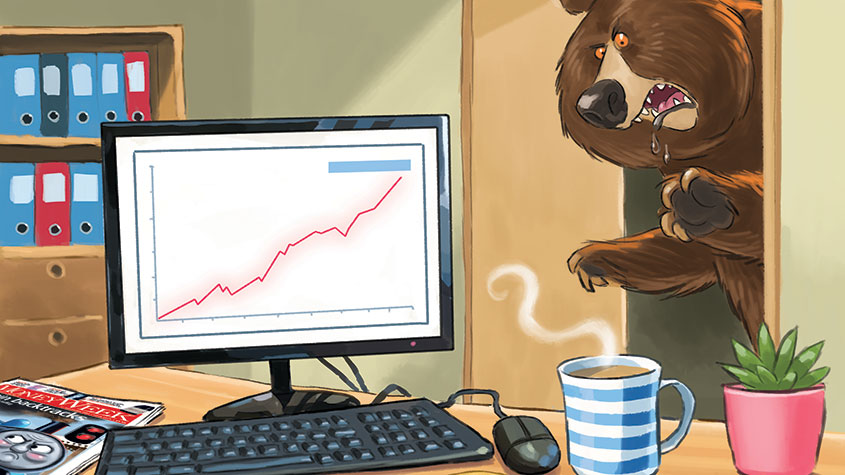If you know where to look, there’s lots to buy
Markets look pricey,but there are actually many more stocks trading below average valuations than usual, says Merryn Somerset Webb.

Get the latest financial news, insights and expert analysis from our award-winning MoneyWeek team, to help you understand what really matters when it comes to your finances.
You are now subscribed
Your newsletter sign-up was successful
Want to add more newsletters?

Twice daily
MoneyWeek
Get the latest financial news, insights and expert analysis from our award-winning MoneyWeek team, to help you understand what really matters when it comes to your finances.

Four times a week
Look After My Bills
Sign up to our free money-saving newsletter, filled with the latest news and expert advice to help you find the best tips and deals for managing your bills. Start saving today!

Global investors are more bearish today than at any point since the financial crisis. That, at least, is what the latest Bank of America Merrill Lynch (BAML) survey of fund managers tells us. They have, they say, the lowest allocation to equity markets since March 2009. Some data even suggests that, in the US at least, the bond weighting in portfolios exceeds that of equities. That's highly unusual (if you want to make inflation-beating long-term returns, you need equities). So what's spooking managers?
BAML's chief strategist Michael Hartnett puts it down to worries about recession; about trade wars; about high levels of corporate debt; and about "monetary policy impotence" the possibility that central bankers can't do much more to stimulate debt-ridden economies. This makes some sense. But long-term readers will remember that March 2009 was the bottom of the bear market of 2007-2009; and know that stockmarket returns are only partly about these things. Politics (in the form of a trade war, or even a long cold war between the US and China) matters far more to markets than it did a few years ago. But still, barring political apocalypse, the most important factor behind your returns is the price at which you buy.
Here it gets complicated. Markets look pricey, says Societe Generale's Andrew Lapthorne. But look closer and you'll see a huge "polarisation of value". Stocks that operate as bond proxies (ie, that rise with rising bond prices) have become pricier, while "more cyclical and negatively bond-correlated equities have seen valuations slump to levels normally associated with a recession". There are actually many more stocks trading below average valuations than usual. So much so, you could almost say that while the average equity market isn't cheap, given that the overvaluation is concentrated in fewer stocks than usual, the average stock is. If you know where to look, there's lots to buy.
MoneyWeek
Subscribe to MoneyWeek today and get your first six magazine issues absolutely FREE

Sign up to Money Morning
Don't miss the latest investment and personal finances news, market analysis, plus money-saving tips with our free twice-daily newsletter
Don't miss the latest investment and personal finances news, market analysis, plus money-saving tips with our free twice-daily newsletter
Few people would think of the UK as home to a group of world-leading engineering firms. They should think again. As Dr Mike Tubbs notes, the UK is a hotbed of international engineering brilliance. For two reasonably-priced stocks to think about, turn to this week's cover story.
This week, we review Bitcoin Billionaires, a book on how the Winklevoss twins overcame the disappointment of "derisory" compensation from Mark Zuckerberg (for their contributions to founding Facebook) to make a fortune from cryptocurrencies. Dominic Frisby wonders if Zuckerberg may be about to have the last laugh? Facebook is backing the launch of a new crypto, Libra, one that (thanks to the 2.7 billion users of Facebook products) could get traction at a speed of which bitcoin bulls couldn't dare to dream.
Bitcoin (now ten years old) hasn't reinvented money, nor improved many people's lives (the Winklevoss family aside, of course). Libra, says Dominic, may not be a particularly pure crypto, but it "could still be world changing". For more, see Anthony Hilton's thoughts on modern payment systems (it's all about China) and listen to our latest podcast on the topic. I haven't been especially interested in cryptocurrencies so far. But, as you will hear, I'm very interested in Libra.
Get the latest financial news, insights and expert analysis from our award-winning MoneyWeek team, to help you understand what really matters when it comes to your finances.

-
 Can mining stocks deliver golden gains?
Can mining stocks deliver golden gains?With gold and silver prices having outperformed the stock markets last year, mining stocks can be an effective, if volatile, means of gaining exposure
-
 8 ways the ‘sandwich generation’ can protect wealth
8 ways the ‘sandwich generation’ can protect wealthPeople squeezed between caring for ageing parents and adult children or younger grandchildren – known as the ‘sandwich generation’ – are at risk of neglecting their own financial planning. Here’s how to protect yourself and your loved ones’ wealth.
-
 What to do as the age of cheap money and overpriced equities ends
What to do as the age of cheap money and overpriced equities endsEditor's letter The age of cheap money, overpriced equities and negative interest rates is over. The great bond bull market is over. All this means you will be losing money, says Merryn Somerset Webb. What can you do to protect yourself?
-
 Investors are bullish – but be very careful
Investors are bullish – but be very carefulEditor's letter Many investors are buying the dip, convinced the latest upswing is the start of a new bull market. The odds are that it’s not, says Andrew Van Sickle. The bear has unfinished business.
-
The MoneyWeek approach to investing
Editor's letter At MoneyWeek, our aim is simple: to give you intelligent and enjoyable commentary on the most important financial stories, and tell you how to profit from them. So how do we do that?
-
 Celebrity bitcoin ads echo the subprime mortgage crisis
Celebrity bitcoin ads echo the subprime mortgage crisisEditor's letter A wave of ads featuring celebrities punting crypto to the masses are reminiscent of how low income Americans were encouraged to take on loans they couldn’t afford, says Merryn Somerset Webb.
-
 Will the UK's property slowdown turn into a house-price crash?
Will the UK's property slowdown turn into a house-price crash?Editor's letter As the cost-of-living crisis intensifies and interest rate rise, it is hard to see reasons for UK house prices to keep rising, says Merryn Somerset Webb.
-
 The unintended consequences of ESG investing
The unintended consequences of ESG investingEditor's letter Many people are refusing to invest in energy companies, citing "ESG" concerns. But we still need fossil fuels, says Merryn Somerset Webb, and will for years to come. Boycotting the sector is a bad idea.
-
 What sardines can teach investors about today's markets
What sardines can teach investors about today's marketsEditor's letter A California tale of “eating sardines” and “trading sardines” can help us divide investments into speculative and real, says Merryn Somerset Webb. Something that's very useful when looking at today’s markets.
-
 The market finally seems to be getting it
The market finally seems to be getting itEditor's letter Reality checks are coming fast to the markets, says Merryn Somerset Webb – with even 2022’s safe havens beginning to reflect recession worries.